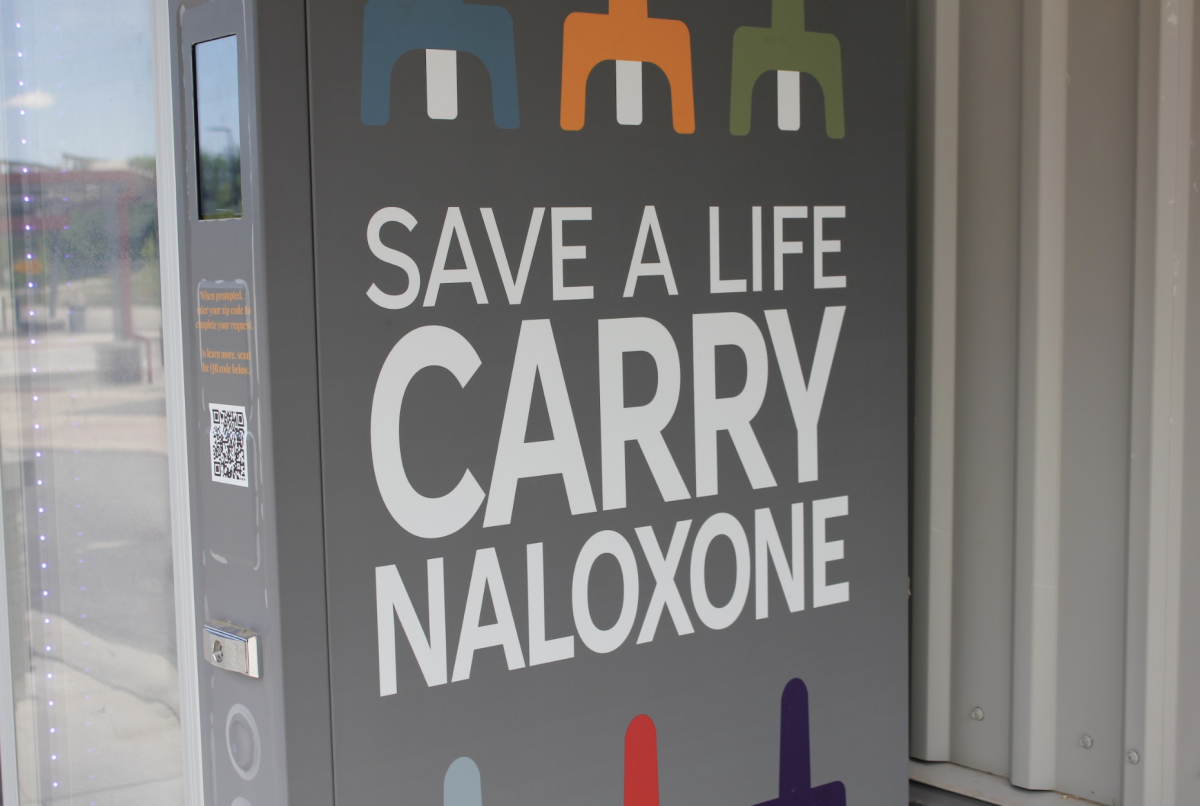
The Lawrence Transit station vending machine provides free narcan when residents enter their zip code.
Eudora has not had any opioid overdose incidents this year, but Douglas County reported a spike in cases this spring.
There were 33 opioid overdoses between March and May in eastern Kansas, according to the Kansas Department of Health and Environment. Douglas County accounted for a majority of emergency department visits in the area, which was double what was expected, according to Lawrence-Douglas County Public Health.
First responders in Eudora haven’t had any incidents this year despite the number of overdoses in the county, Police Chief Wes Lovett said.
“Very little fentanyl can kill you,” Lovett said. “We’re just very fortunate we’ve not had to deal with it in Eudora this year.”
When Eudora had overdose incidents a few years ago, first responders were trained on how to disperse naloxone. Commonly known as narcan, naloxone reverses the symptoms of an overdose.
Overdoses and medical calls caused a shortage in first responders’ supply of naloxone two years ago, Lovett said.
“Narcan used to be really hard to get, and wasn’t as available as it is today,” he said. “Fortunately for us, we have plenty and haven’t had an instance lately where we had to use it.”
Naloxone is available for free across Douglas County, including at a Lawrence Transit Station vending machine, by entering a zip code, said Cara Hansuld, DCCCA prevention services program manager.
DCCCA has funded the naloxone vending machine since February 2024. Douglas County residents also can request free naloxone and fentanyl test strips online through DCCCA’s website, she said.
“It’s important for our residents to know what’s happening,” Hansuld said. “This [the rise in incidents] indicates to me that there is more concentrated fentanyl. It’s good for everyone to know so they can be prepared in case that happens to them or somebody close to them.”
Lawrence-Douglas County Public Health also provides naloxone and fentanyl test strips and education on how to use them. Executive Director Jonathan Smith said it’s crucial to share accurate, timely information about the clinic’s resources to save lives.
“This is a moment for the community to be alert and educated about resources available to prevent overdoses from happening,” Smith said. “The most important thing we can do is act early, raise awareness and make sure people know where to go for support.”
For Douglas County, collaboration has been key in helping address the opioid crisis.
Bert Nash partners with first responders across the county to provide not only treatment but also mental health resources. Eudora residents have access to the services they provide in mental health support and the Treatment Recovery Center.
“Our community is fortunate to have a wide range of strengths and resources, and it’s only through collective action that we can make meaningful progress,” senior director of crisis services Ryan Sztorch said.
Although first responders haven’t identified a root cause for the uptick in overdoses, they agree the goal is to continue educating Douglas County residents and providing resources to those in need.
“Any kind of drug these days, you don’t know what’s in it and how it can affect you,” Lovett said. “Don’t do it at all, because you just don’t know.”
Reach reporter Maya Smith at [email protected].
Douglas County resources
DCCCA: Free Narcan and fentanyl test strips, and naloxone vending machine. Contact: [email protected].
Lawrence-Douglas County Public Health: Free Narcan and test strips, no appointment needed. Contact: 785-843-3060.
Treatment and Recovery Center: Open 24/7 for detox, mental health and substance use care. Contact: 785-843-9192.
Heartland Community Health Center: Medication-assisted treatment, mental health care, walk-ins welcome. Contact: 785-841-7297.